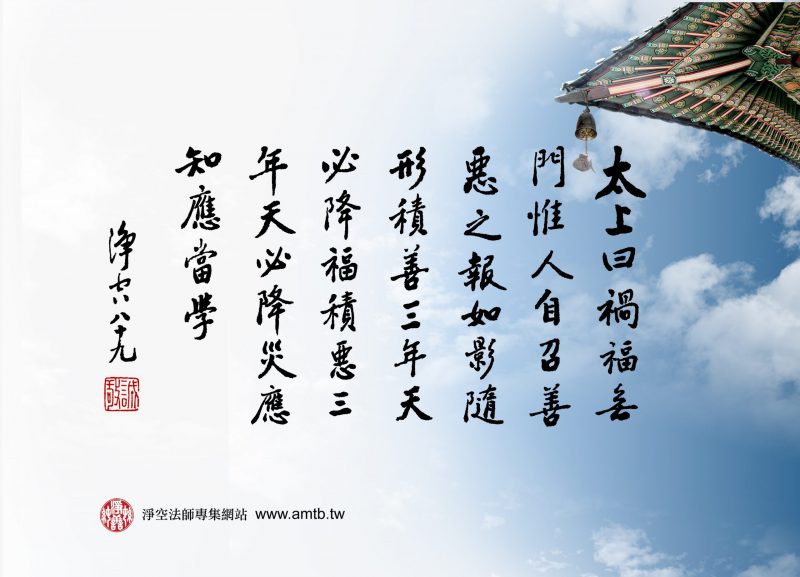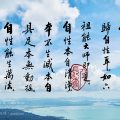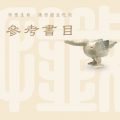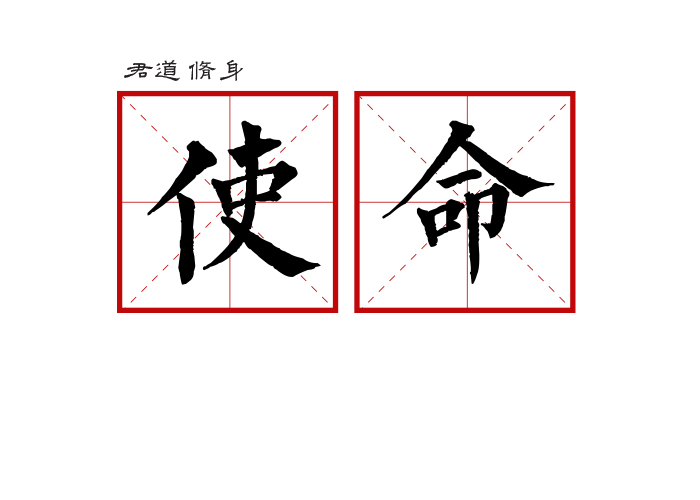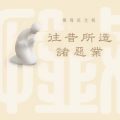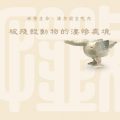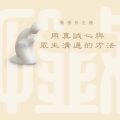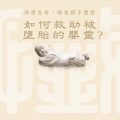| 《Treatise of the Most Exalted One on Cause and Effect》《太上感應篇》 |
| Ta-1 | The Most Exalted One says:Misfortune and blessings do not come to us without reason, we bring them upon ourselves.太上曰:禍福無門,惟人自召 |
| Ta-2 | The consequences of good and evil deeds are like the shadow, following the body wherever it goes.善惡之報,如影隨形。 |
| Ta-3 | The right path leads to progression, but the wrong path leads to regression..是道則進,非道則退。 |
| Ta-4 | Accumulate virtue and merits.積德累功。 |
| Ta-5 | Be compassionate towards all beings.慈心於物。 |
| Ta-6 | Be loyal to the country, filial to our parents, friendly to our friends, dutiful to our siblings.忠孝友悌。 |
| Ta-7 | Change others by correcting ourselves first.正己化人。 |
| Ta-8 | Take pity on the desolate, help the lonely, respect the elderly, and care for the weak……矜孤恤寡,敬老懷幼。 |
| Ta-9 | Be sad for other people’s sufferings, and rejoice in their blessings.宜憫人之凶,樂人之善。 |
| Ta-10 | Give succour to those in need, and rescue those in danger.濟人之急,救人之危。 |
| Ta-11 | Regard other peoples gain as my own gain, and their loss as my own loss.見人之得,如己之得。見人之失,如己之失。 |
| Ta-12 | Speak not about other peoples weaknesses, or boast about our own strengths.不彰人短,不炫己長。 |
| Ta-13 | Resist the evil, promote the good.遏惡揚善。 |
| Ta-14 | Give more, take less.推多取少。 |
| Ta-15 | Bear no hatred to those who insult you.受辱不怨。 |
| Ta-16 | Receive kindness, when given, as if unexpected.受寵若驚。 |
| Ta-17 | Offer kindness to others without seeking reward and without regrets.施恩不求報,與人不追悔。 |
| Ta-18 | Good people are those who are respected by others, blessed by the Heavens, accompanied by good fortune, avoided by the demons, protected by the gods, and succeed in everything they do.所謂善人,人皆敬之,天道佑之,福祿隨之,眾邪遠之,神靈衛之;所作必成。 |
| Ta-19 | Yet there are some who commit wrongdoings and are unreasonable.非義而動,背理而行。 |
| Ta-20 | Secretly, they undermine the good people, and detest their superiors and parents.以惡為能,忍作殘害。 |
| Ta-21 | They despise their teachers, and act against.陰賊良善,暗侮君親。 |
| Ta-22 | They despise their teachers, and act against what their own duty demands of them.慢其先生,叛其所事。 |
| Ta-23 | They deceive the uneducated, and slander their friends.誑諸無識,謗諸同學。 |
| Ta-24 | They are deceitful and hypocritical; they bear false witness against their family.虛誣詐偽,攻訐宗親。 |
| Ta-25 | They are merciless, brutal and obstinate.剛強不仁,狠戾自用。 |
| Ta-26 | They confuse right and wrong, good and evil.是非不當,向背乖宜。 |
| Ta-27 | They oppress and appropriate the merits of their subordinates; they ingratiate themselves with their superiors.虐下取功,諂上希旨。 |
| Ta-28 | They are never grateful and always vengeful.受恩不感,念怨不休。 |
| Ta-29 | They abuse the desolate and coerce the vulnerable.凌孤逼寡。 |
| Ta-30 | They are corrupt and disregard the law.棄法受賂。 |
| Ta-31 | They say wrong is right, and right is wrong.以直為曲,以曲為直。 |
| Ta-32 | Although they know their wrongs, they refuse to change; and although they know what is good, they refuse to do good.知過不改,知善不為。 |
| Ta-33 | They disparage the holy and wise.訕謗聖賢。 |
| Ta-34 | They show contempt towards morality and virtue.侵凌道德。 |
| Ta-35 | They wish that others suffer loss; they spoil others gain or success.願人有失,毀人成功。 |
| Ta-36 | They exchange what is valuable for what is worthless, and expend public properties for selfish gains.以惡易好,以私廢公。 |
| Ta-37 | They take advantage of others, and conceal others good qualities.竊人之能,蔽人之善 |
| Ta-38 | They tear families apart.離人骨肉。 |
| Ta-39 | They destroy what others hold dear.侵人所愛。 |
| Ta-40 | They assist others in committing crimes.助人為非。 |
| Ta-41 | They succeed by the degradation of others, and conceal their own faults.挫人所長,護己所短。 |
| Ta-42 | They are indignant and abusive towards their teachers; they provoke their parents and siblings.恚怒師傅,抵觸父兄。 |
| Ta-43 | They are unjust in giving reward or punishment..賞罰不平。 |
| Ta-44 | They overindulge in pleasure.逸樂過節。 |
| Ta-45 | They oppress and threaten their subordinates.苛虐其下,恐嚇於他。 |
| Ta-46 | They blame the gods and other people, and rail against the winds and rains.怨天尤人,呵風罵雨。 |
| Ta-47 | They incite disputes and lawsuits within a party.鬥合爭訟,妄逐朋黨 |
| Ta-48 | They abandon the old things when they get new things.得新忘故。 |
| Ta-49 | They are hypocritical.口是心非。 |
| Ta-50 | They slander others but feign honesty; they rail at the gods and claim to be righteous.毀人稱直,罵神稱正。 |
| Ta-51 | They are quarrelsome amongst their family.骨肉忿爭。 |
| Ta-52 | As husbands, they are neither faithful nor good. As wives, they are neither gentle nor reasonable.男不忠良,女不柔順。 |
| Ta-53 | As husbands, they do not get along with their wives; as wives, they do not respect their husbands.不和其室,不敬其夫。 |
| Ta-54 | If the husband is always boastful of himself, the wife will become jealous.每好矜誇,常行妒忌 |
| Ta-55 | They curse themselves and others, and are partial in their love and hatred.自咒咒他,偏憎偏愛 |
| Ta-56 | They harm children, abort the unborn, and commit clandestine misdeeds.損子墮胎,行多隱僻 |
| Ta-57 | For all those sins, the life expectancy of the evil-doer is reduced in proportion to the gravity of his offence, and dies when his life is thus exhausted. If there is remainder to the wages of his sins after his death, his descendants will suffer.如是等罪,司命隨其輕重,奪其紀算。算盡則死;死有餘責,乃殃及子孫。 |
| Ta-58 | If a person’s intention is good, although he has yet to do any good deeds, benevolent spirits are already accompanying him.心起於善,善雖未為,而吉神已隨之。 |
| Ta-59 | If a person’s intention is evil, although he has yet to commit any evil deeds, malevolent spirits are already following him.心起於惡,惡雖未為,而凶神已隨之。 |
| Ta-60 | He who has committed evil deeds must repent and change. If he ceases wrongdoing and practises goodness, he will gradually obtain blessings, thus turning misfortune into blessing.其有曾行惡事,後自改悔。諸惡莫作,眾善奉行。久久必獲吉慶。所謂轉禍為福也。 |
| Ta-61 | Blessed is he who speaks, thinks and practises goodness. If a person practises these three ways of goodness daily, the Heavens will bestow blessings on him within three years.吉人語善、視善、行善,一日有三善,三年天必降之福。 |
| Ta-62 | Unfortunate is the man who speaks, thinks and commits evil. If a person practises these three ways of evils daily, the Heavens will punish him with misfortunes within three years.凶人語惡、視惡、行惡,一日有三惡,三年天必降之禍。 |
| 《Lord Superior Wen Chang Tract of the Quiet Way》《文昌帝君陰騭文》 |
| Ta-63 | Rescue those in difficulty. Relieve those in distress. Be compassionate towards the desolate. Forgive the wrongs of others.救人之難。濟人之急。憫人之孤。容人之過。 |
| Ta-64 | He who wishes to increase his fortune must lay its foundation on the bottom of his heart.欲廣福田,須憑心地。 |
| Ta-65 | Practise benevolence wherever you find the opportunity, and let your good deeds go unnoticed.行時時之方便,作種種之陰功。 |
| Ta-66 | Help all beings, sentient or not; practice goodness and accumulate merit.利物利人,修善修福。 |
| Ta-67 | Be honest as the Heavens in conducting your affairs.正直代天行化。 |
| Ta-68 | Serve your country and the people with compassion.慈祥為國救民。 |
| Ta-69 | Be loyal to your superiors, filial to your parents, respectful to your elders and siblings, and sincere to your friends.忠主孝親,敬兄信友。 |
| Ta-70 | Fulfill your four obligations (to parents, teachers, country and fellow mankind).報答四恩。 |
| Ta-71 | Abide by the three teachings (Confucianism, Buddhism and Taoism).廣行三教。 |
| Ta-72 | Be compassionate towards the desolate, and help the abandoned.矜孤卹寡。 |
| Ta-73 | Respect the elderly, and help the destitute.敬老憐貧。 |
| Ta-74 | If your family is relatively wealthy, extend a helping hand to your relatives.家富,提攜親戚。 |
| Ta-75 | If the harvest fails, provide for your neighbours and friends.歲饑,賑濟鄰朋。 |
| Ta-76 | Be honest and fair in doing business, do not take more or give less than what you should.斗秤須要公平,不可輕出重入。 |
| Ta-77 | Be magnanimous to your servants, it is not appropriate to be overly demanding.奴僕待之寬恕,豈宜備責苛求。 |
| Ta-78 | Reproduce and distribute scriptures, build and repair temples.印造經文,創修寺院。 |
| Ta-79 | Donate medicines to alleviate the sufferings of the sick.捨藥材以拯疾苦。 |
| Ta-80 | Give tea and water to those who thirst.施茶水以解渴煩。 |
| Ta-81 | Be cautious with fire and do not burn mountains or forests.禁火莫燒山林。 |
| Ta-82 | Seek the friendship of those who are good, they will help you practise virtue in body and soul.善人則親近之,助德行於身心。 |
| Ta-83 | Avoid those who are wicked, to prevent disasters and calamities in life.惡人則遠避之,杜災殃於眉睫。 |
| Ta-84 | Pass in silence over evil and praise all that is good.常須隱惡揚善。 |
| Ta-85 | Do not say one thing but believe another.不可口是心非。 |
| Ta-86 | Expound the moral maxims to correct the faults of others.垂訓以格人非。 |
| Ta-87 | Contribute money to help others succeed.捐資以成人美。 |
| Ta-88 | Do things according to morality.作事須循天理。 |
| Ta-89 | Let your words be pleasant to other peoples mind.出言要順人心。 |
| Ta-90 | Refrain from all wrongdoings, and do all that is good.諸惡莫作,眾善奉行。 |
| Ta-91 | Immediate rewards may be experienced personally.近報則在自己。 |
| Ta-92 | Remote rewards will be blessed upon your descendants.遠報則在兒孫。 |
| Ta-93 | Great fortune and blessings will certainly come your way if you do good deeds that are unknown to others!百福駢臻,千祥雲集,豈不從陰騭中得來者哉! |
| 《Lord Superior Fu You Heart Sutra》《孚佑帝君心經》 |
| Ta-94 | Of all the creatures of nature, humans are the most intelligent. A human person is intelligent not by virtue of his body, but of his mind.天生萬物。惟人最靈。Lord Superior Fu You Heart Sutra 非人能靈。實心是靈。 |
| Ta-95 | Mind acts as a leader and governs every bone of one’s body and manage one’s affection. Mind has no substance or form. Mind is awarded by the Heavens and has good conscience and ability.心為主宰。一身之君。役使百骸。區處群情。物無其物。形無其形。稟受於天。良知良能。 |
| Ta-96 | One’s intrinsic quality of mind is gradually lost if one’s spirit is restricted or one’s desire is constructed. When one’s mind is lost, one’s body will collapse.氣拘欲蔽。日失其真。 此心既失。此身亦傾。 |
| Ta-97 | If you wish to practise goodness, first control your mind.欲善其身。先治其心。 |
| Ta-98 | If you are able to control your mind, your surroundings will be serene and peaceful.人心得治。天地清寧。 |
| 《Tao Te Ching》–The Canon of Reason and Virtue《道德經》 |
| Ta-99 | The Sage manages affairs without action;He preaches the doctrine without speaking.All things take their rise, but he does not turn away from them;He gives them life, but does not take possession of them;He acts, but does not appropriate;Accomplishes, but claims no credit.(《Tao Te Ching》Chapter 2)聖人處無為之事,行不言之教;萬物作而弗始,生而弗有,為而弗恃,功成而不居。(《道德經》第2章) |
| Ta-100 | The good man is like water;Water benefits all things but does not compete with them.It dwells in (the lowly) places that all disdain -Wherein it comes near to the Tao.(《Tao Te Ching》Chapter 8)上善若水,水善利萬物而不爭。處眾人之所惡,故幾於道矣。 (《道德經》第8章) |
| Ta-101 | Temper a (sword-edge) to its very sharpest,But the edge will not last long.Fill your house with gold and jade,But you will not be able to keep them forever.To be proud with wealth and honourIs to sow the seeds of your own downfall.Retire when your work is done,Such is Heavens way.(《Tao Te Ching》Chapter 8)揣而銳之,不可長保。金玉滿堂,莫之能守。富貴而驕,自遺其咎,功成名遂身退,天之道。(《道德經》第8章) |
| Ta-102 | A wise person will not be broadly knowledgeable. A broadly knowledgeable person will not be wise.(《Tao Te Ching》Chapter 81)智者不博,博者不智。(《道德經》第81章) |
